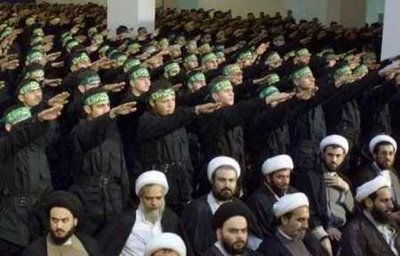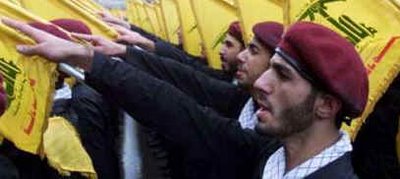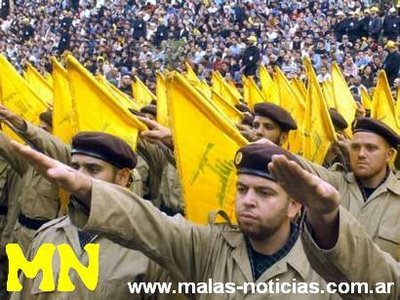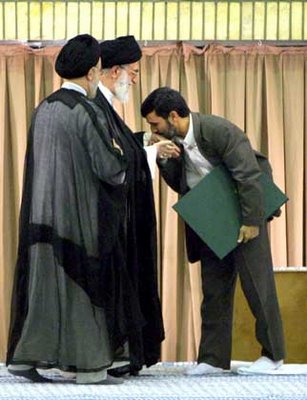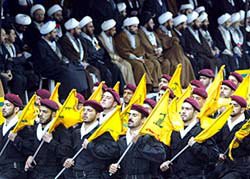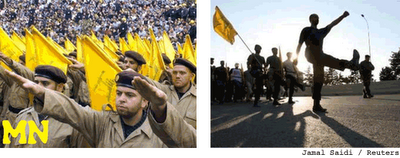I've
previously speculated about whether Mousavi would be any better than Amadinejad as leader of Iran. Yet the fact is, under Iran's political system, what the President thinks is not nearly as important as what the "Supreme Leader" thinks and does; he has the final say in all matters.
The following article in the CSM takes a look at Iran's current supreme leader, Ayatollah Khamenei:
How Iran's supreme leader, Ayatollah Khamenei, sees the worldSince the Islamic revolution in 1979, which toppled with breathtaking speed Iran's corrupt and secular shah, the country has had two rulers.
One is the package – standard in modern republics – of head of state and parliament. And then there’s the supreme leader, who, in practice, has to work with the consent of the nation’s formally democratic institutions but who, in theory, has the power to overrule them if he feels their actions run counter to God’s will. [...]
I think the author has got it wrong here. He should swap the words "practice" and "theory". Khamenei IS overruling democracy. Iran is not a real democracy, voting is just a sham.
[...] Khamenei is preserving his vision, say analysts, of what the Islamic Republic should look like in the short term by denying the popular will. But he has taken that step, they say, at a cost so great to his own image and to that of the office he occupies that the Islamic Republic is unlikely to be the same again.
[...]
Scholars of Iran say that while Khamenei has for most of his 20 years in power sought to avoid confrontation and played a behind-the-scenes role, he has always been devoted to adhering to Khomenei's call for a velayat-e-faqih, or "rule of the jurisprudent," which in practice means one man like Khamenei acting as "jurisprudent," or interpreter of God's rule on earth.
ADDING WORD "ABSOLUTE" TO HIS POWERS
Indeed, after Khamenei rose to Iran's most important position in 1989, he went further than Khomenei had, leading a successful effort to have the role of the faqih, or jurisprudent, defined more specifically in the Constitution with the insertion of the word "absolute" as in the "absolute rule of the jurisprudent."
When his younger brother Hadi Khamenei, a reformist cleric who favors more oversight and checks on the power of the supreme leader, called for this in a sermon in 1999, he was savagely beaten by basiji militia loyal to the ayatollah – the same group that has been used to attack protesters in recent days.
"I think, in some respects, what Khamenei has done in the past 10 years has been to amass even more authority institutionally than his predecessor ever had," says Suzanne Maloney, an Iran scholar at the Saban Center for Middle East Policy at the Brookings Institution in Washington. "He clearly sees the revolution itself as under threat, and Iran has already begun to deliver with the violence over the weekend. I think they're in a good position to repress, and I don't think Khamenei will blink." [...]
So far so good. But then Ms. Maloney can't resist overstating her case. She goes on to compare Khamenei to Dick Cheney. Yeah, right. Dick Cheney claims absolute power as God's representative on Earth? And I thought he was just an elected "vice president". Silly me.
Ms. Maloney should note, that in 2005, Bill Clinton,
speaking at the Davos conference, admitted he admires Iran, because there, the "good guys" always win the elections by two thirds or more, unlike in his own country. Follow the link. He actually describes the Iranian leadership as liberals and progressives, like himself. Khamenei was the Supreme Leader back then too when Clinton said that. Khamenei, a liberal progressive?
I don't think any of the Democrats are in a position to be throwing stones right now. But back to Khamenei:
[...] Mr. Cole, at the University of Michigan, says Khamenei's worldview has led him to see Iran's reformists as abiding threats, even though many of them just want to tweak the nature of the Islamic revolution, not overthrow it entirely.
"What a lot of the reformers want is consumer capitalism and international integration … and Khamenei sees this as an existential to the republic," says Cole. "Khamenei is afraid that if Iran isn't economically independent, then the US will find a way to get a hold of it again and subjugate it. A lot of his paranoia is that the reformists want to give away the show."
He's paranoid because reformers might introduce the Iranian version of
glasnost, which could weaken or eliminate his power.
The bottom line is, the Supreme Leader matters more than the President, because he has more power. It's what makes Iran a Theocracy, not a Democracy.
When the Shah was overthrown in 1979, many of the revolutionaries wanted a secular democratic government, and they were promised that, but they were instead subjugated and crushed by the very mullah's they had helped to power. Many Iranian's still want what they were promised 30 years ago. That struggle continues today, and is a large part of what we are seeing now.
Another article from the CSM:
Why Iran's Ahmadinejad is preferred in IsraelThe title is somewhat misleading. Some Israeli's prefer Amadinejad, while others think regime change in Iran would be better. Good arguments are offered for both viewpoints. But as long as Iran has a Supreme Leader who can override any elected officials with his "divine" authority, I don't know that it will matter much, in a substantial way, who is president. The position of "Supreme Leader" would have to be changed or eliminated in order to bring about any meaningful reform.
I tend to lean toward the side of the reformers. As someone points out in the article, Iran's nuclear program is proceeding anyway under Amadinejade. But admittedly, there are many unanswered questions about what would happen if Iranian reformers were to come to power. How much reform would we see, an who would
really have the power?
Related Link:Persian Paranoia

